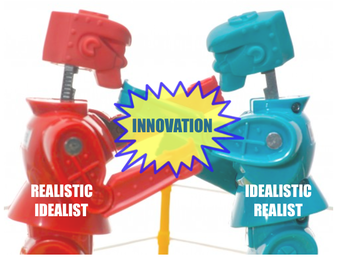 I was at a meeting recently where attendees were discussing innovation and how and where - and even whether - it should happen in large organizations. To innovate or not to innovate… As sides made their cases for and against, I offered a comment to the group that while we appeared to be presenting contradictory positions we actually agreed on the problems large organizations face in innovating. And, there wasn’t really any disagreement about whether they needed to. The difference in perspective was that one group saw the problems preventing innovation in large organizations as too big and too entrenched to solve and the other group thought they presented the perfect opportunity. In response to my assessment, someone commented: “Yeah, this group is the realists and that group is the idealists.” Everyone seemed to agree. And, I guess I didn’t immediately disagree, but it seemed way too simple, and it bothered me for some reason. For starters, I don’t like being put into an idealist box - which of course is where I was - simply because I believe human-created problems are solvable by humans. But, I let it go, and just started furiously taking notes on my phone about all the ways I felt that this seemingly simple comment presented a patently unhelpful view of innovation, organizations, and the world. Why do we attribute realism to the point-of-view that things cannot, will not, and perhaps even should not change? Why is that realistic in today’s world? Why do we attribute idealism - as the counter to realism - to people who believe things can and should change? In today’s world, isn’t that a lot more realistic? Isn’t it realism to know that change is inevitable? That innovation is necessary to keep learning, stay competitive, and to keep up with customers and markets? Is it really idealism to try and predict, invest in, and prepare for not just reacting to but leading that inevitable change? An idealist should be more than a dreamer, and idealism should never just be an excuse to pretend difficult problems are any less complex than they really are - or to deny that their solutions should be grounded in reality. Alternately, a realist shouldn’t passively accept that the current state is inevitable, and realism should never just be an excuse to lie prostrate in the face of difficult problems because, well, that’s just the way it is. Innovation is messy work and organizations are messy places. The most innovative organizations need idealistic realists mixing it up every day with realistic idealists. Anything that makes the people or the process sound any simpler may make innovation easier to talk about but can also make it a lot more difficult to achieve.
1 Comment
Anderson
5/23/2018 06:55:28 am
Wanted to add that a friend emailed me this great quote from Robert Kennedy after reading this blog: “We must deal with the world as it is. We must get things done. But...there is no basic inconsistency between ideals and realistic possibilities, no separation between the deepest desires of heart and of mind and the rational application of human efforts to human problems.”
Reply
Leave a Reply. |
Categories
All
Archives
April 2024
|
 RSS Feed
RSS Feed